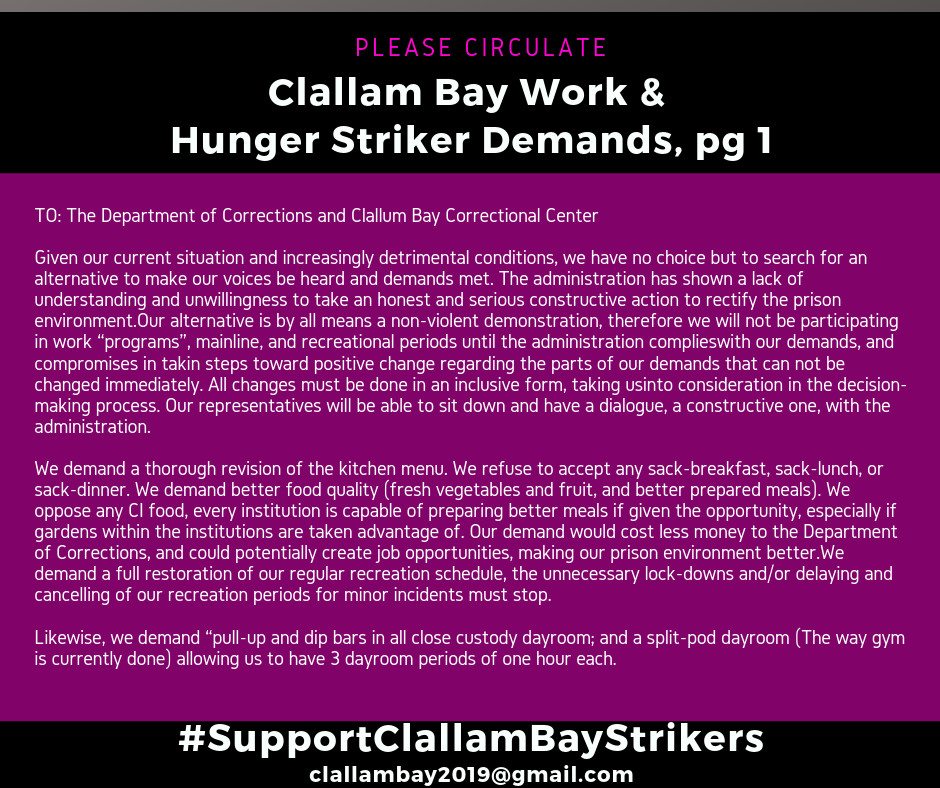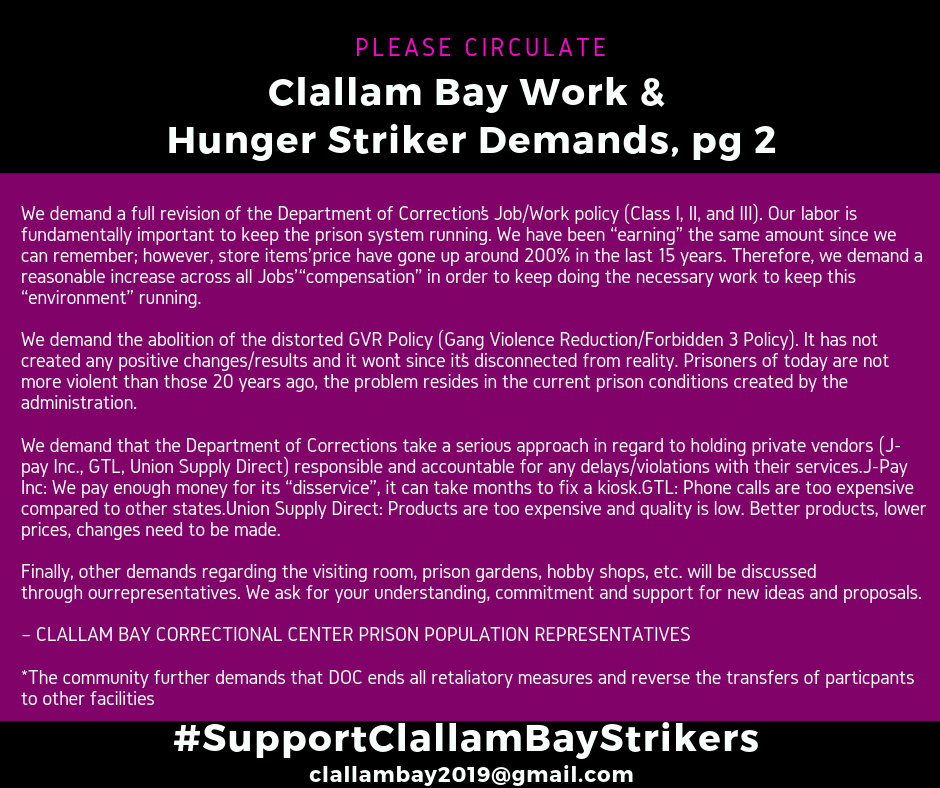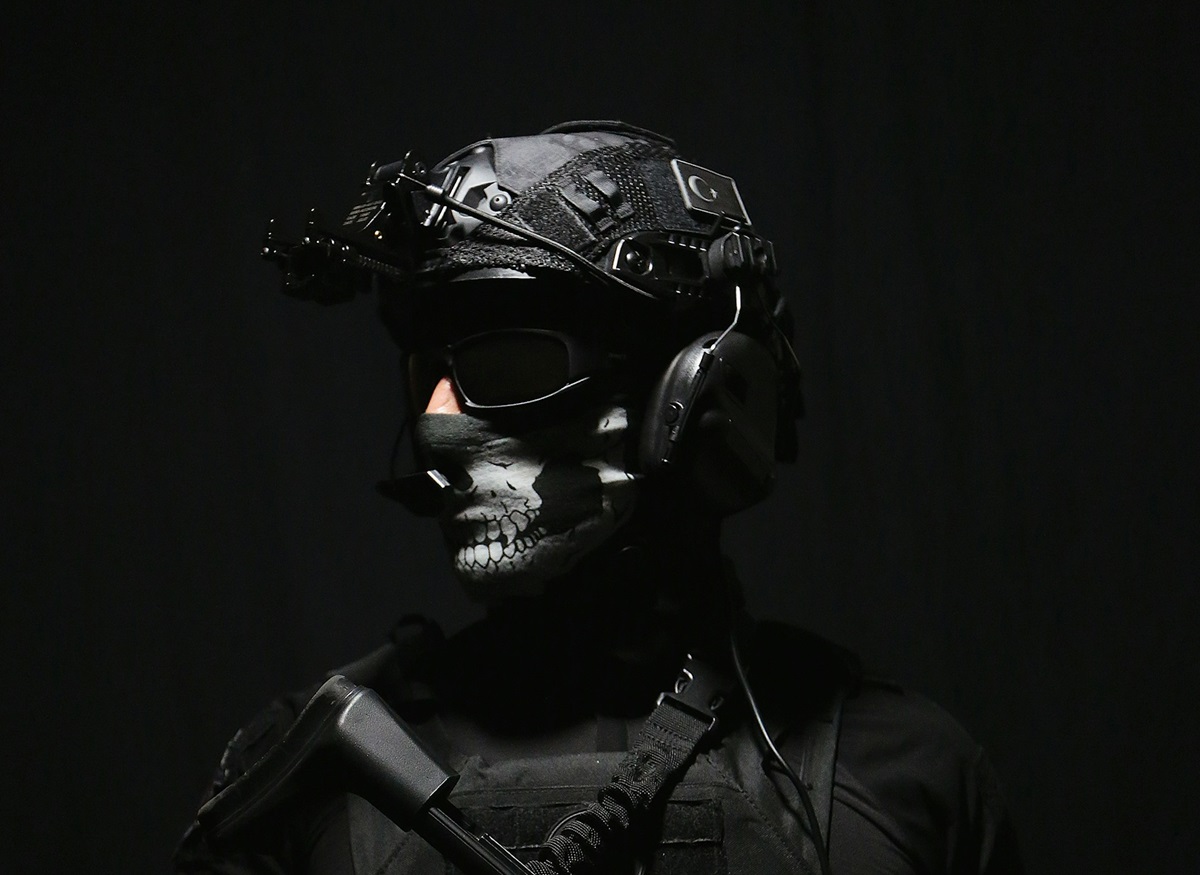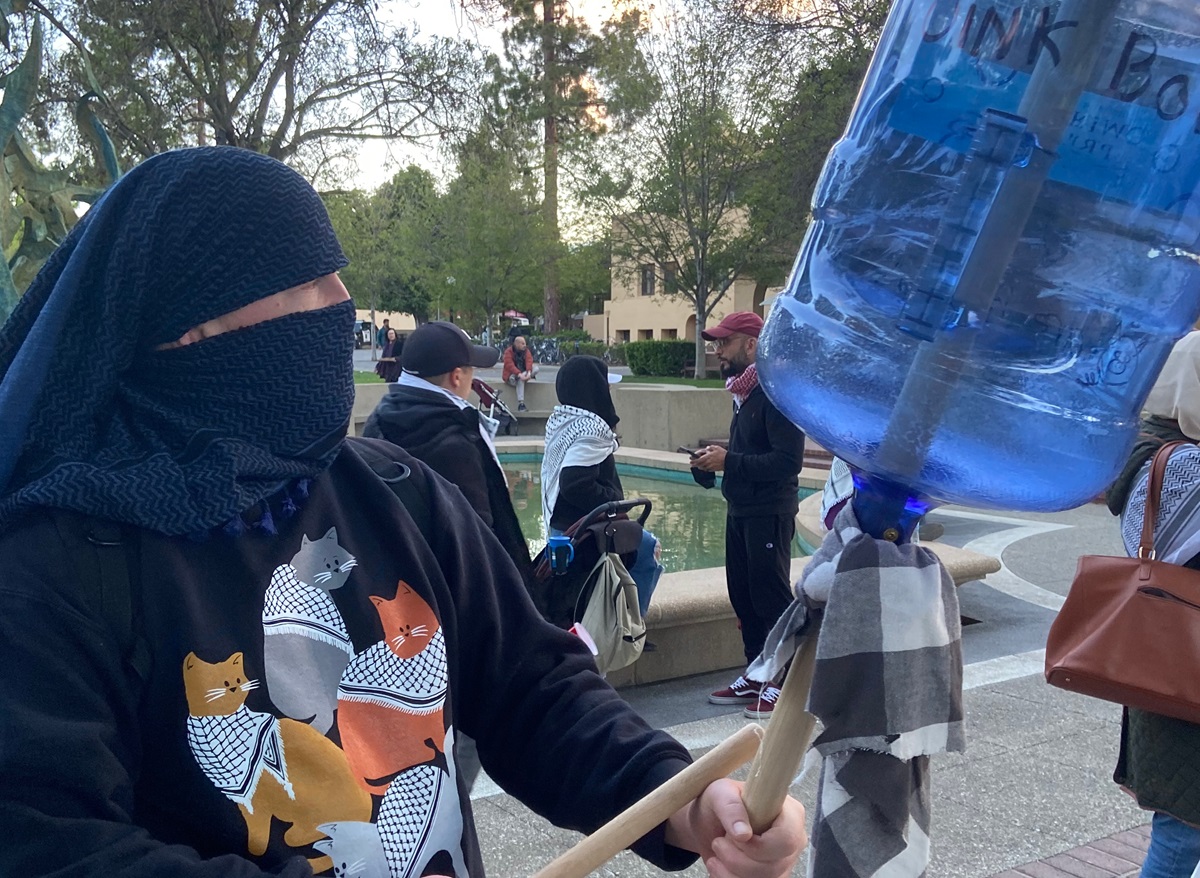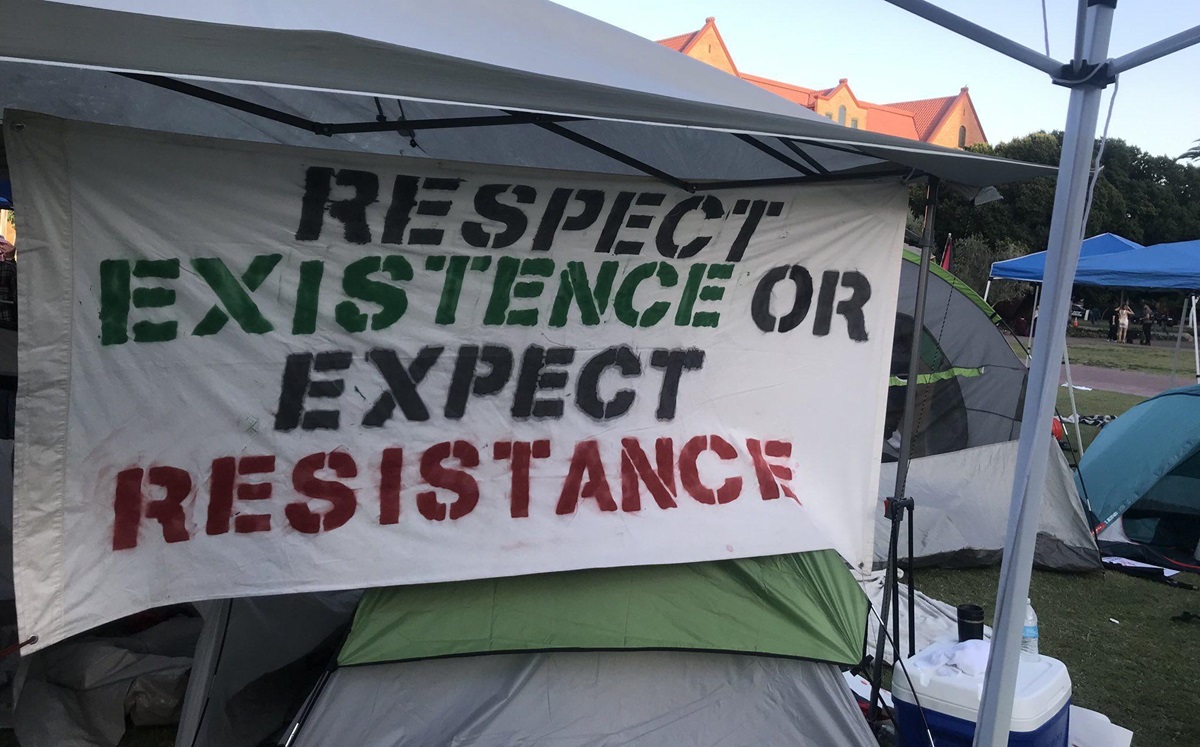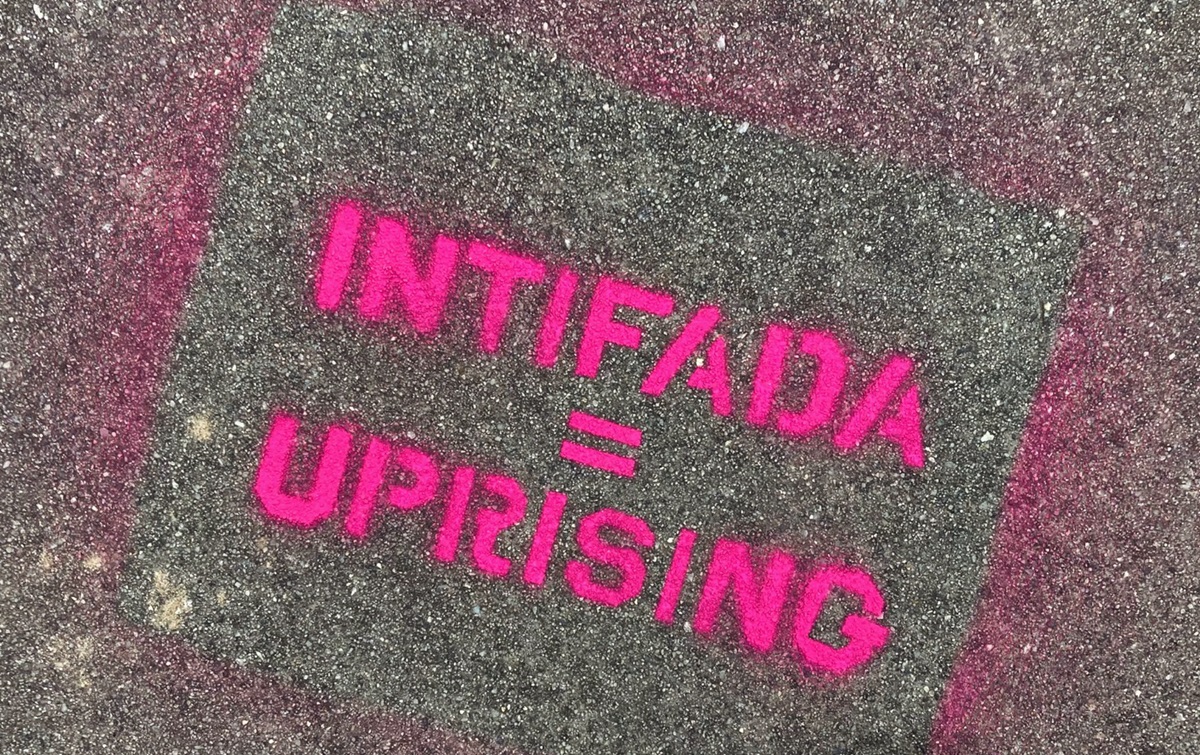Filed under: Action, Incarceration, Labor, Northwest
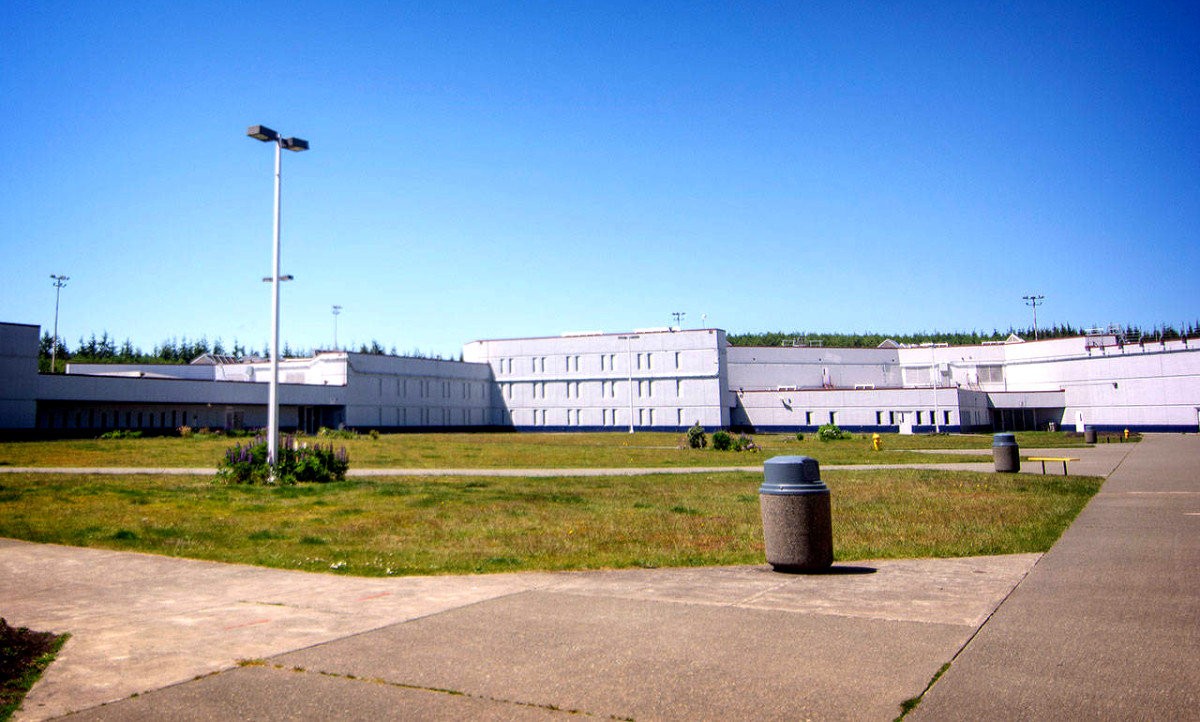
Report from Perilous Chronicle on the ongoing hunger and work strike at Clallam Bay Corrections Center in Washington State.
An unknown number of prisoners began a hunger strike and work stoppage on Monday, October 7 in response to numerous grievances with the facility including food issues, compensation for labor, lack of exercise equipment and complaints about outsourced services such as J-Pay and Global Telelink.
In response to the strike, the prison was placed on lockdown, which is referred to as “restricted-movement status” by the prison, according to prison spokesperson Janelle Guthrie.
In a prepared statement, Guthrie said that prisoners began refusing meals and not attending assigned work or programs on Monday in an action she claimed was initiated by “a small number of incarcerated individuals.”
Supporters say the prison is now retaliating against those participating in the strike.
Holly Phillips, the wife of a prisoner in the facility, told the Peninsula Daily News that the prison was not allowing prisoners to access food packages they had stored to sustain themselves during the strike.
“The prison is refusing to give them their food packages as punishment,” said Phillips. “There is no phone usage. Even the ones in school cannot attend their classes. It’s basically punishment.”
This is info about the hunger and work strike going on with the community incarcerated at Clallam Bay Correctional Center (CBCC) to improve conditions on the inside:#abolishprison #strike@seattleiwoc@inationcorp
https://t.co/bzXOUvNISQ— ECA (Emerald City Anti-fascists) (@eca_network) October 12, 2019
In an email sent through his JPay account and shared with the Peninsula Daily News, Philips’ husband said, “I don’t know when we will be off [lockdown], but they are down-sizing, the shit they have been doing … food, rec, phone calls, the way they treat our family’s [sic] when they visit.”
No New Youth Jail Seattle, a community organization seeking to “redirect funding away from the mass incarceration of youth of color and towards community based prevention,” published the demands of the strikers on their Facebook page.
The group has said that alleged leaders of the strike are being transferred out of the facility, and communication is being prevented between prisoners and outside supporters. They have asked that supporters call the DOC and Governor Jay Inslee to pressure them to meet the strikers demands.
Conflict between prisoners and the prison administration over food quality are not new to Clallam Bay. In November, 2018, Superintendent Jeri Boe planned to remove hot food trays from those prisoners housed in the Intensive Management Unit, also known as segregation. According to Say Sulin Keodara, a prisoner at Clallam Bay, prisoners there planned a hunger strike in response to the announcement.
Keodara wrote in November, 2018:
“I, APIs [Asian Pacific Islanders], Hispanics, Native Americans, Blacks, Whites and many others decided to join together and go on a 3-5 day hunger strike on November 7, 2018. There are approximately 43 out of 62 inmates in our unit (F) who’ve committed and the count in the other IMU is unknown but word was sent.
On November 7th, 2018 the Superintendent is going to take away all (3) hot meals from all and only IMU inmates. Not only does this violate our rights under the 8th and 14th amendments of the constitution but as a matter of principle–it crosses the line.
Even though we are prisoners that does not mean that we lost our vioce and/or our identity as human beings with the natural born right to be treated reasonably and equally. We’ve all heard the saying ‘give ’em an inch and they’ll take a mile.’ We know this to be true because in 2017 DOC limited hot meals at the Washington State Pen. First it was only 2 hot meals, then one, then none. We gave them and inch and they took a mile. Until recently, the majority of inmates came together and went on a 3-4 day hunger strike; until DOC decided (because they had no choice) to give the inmates their hot meals back. Now, they’re trying to take away all hot meals from just IMU inmates. If we allow that, then what’s next? And then what’s next?”
Two days before the policy was to take effect, Superintendent Boe sent another memo announcing that the policy had been postponed, citing the need to perform additional research to ensure that the new bag lunches would meet the requirements of Governor Jay Inslee’s 2013 Executive Order 13-06, which requires all state facilities offer quality food and beverages to those under their supervision, including incarcerated individuals.

The strike at Clallam Bay is part of a recent wave of strikes coming out of Washington prisons in which food quality is a primary complaint. In February, 2019, prisoners at Coyote Ridge Correctional Center held a hunger strike that lasted nearly a month and in April, 2018 prisoners at Washington State Penitentiary, Walla Walla held a hunger strike that lasted about 11 days. In February, 2018, immigrant detainees at the Northwest Detention Center in Tacoma Washington held a hunger strike also involving food quality issues.
Citations:
“Meal strike, restrictions reported at Clallam Bay Corrections Center“, Peninsula Daily News, October 8, 2019.
No New Youth Jail Seattle (@NoNewYouthJailSeattle). “***Call to action! Please share widely!!***”. [Facebook Post], October 11, 2019. Accessed October 11, 2019.
Background:
“Outside support grows as prison resistance continues with ongoing strikes and prisoner-led initiatives“, San Francisco Bay View, November 29, 2018.
“The Formula for Incarcerated Organizers Success, Clallam Bay Prison Strike Update“, Sawari Mi, November 10, 2018.
“Food Strike at Coyote Ridge Corrections Center, Washington“, Perilous, February 1, 2019.
“Hunger Strike at Washington State Penitentiary, Walla Walla“, Perilous, April 1, 2018.
“Work Stoppage and Hunger Strike at Northwest Detention Center, Washington“, Perilous, February 7, 2018.
Archive:
Say Sulin Keodara, Letter to Amani Sawari, November 5, 2018.


